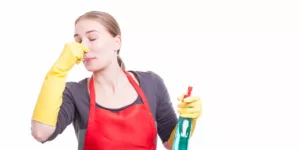Homes can have strange smells from time to time. From the bacon you cooked this morning to the laundry detergent you use and the furry friends that call your house home, homes are naturally full of different odors. Every home has its own unique smell that many homeowners don’t realize.
While most smells are harmless, there are some that may be a sign of something dangerous. Don’t ignore these six house smells.
1. Musty
It’s easy to ignore a pungent, musty odor when you’re in the basement of a home, but if you notice this same smell when you’re above-ground, there may be something seriously wrong with your plumbing.
Broken pipes and sink leaks can lead to mold growth and musty smells.
Mold exposure is unhealthy for everyone, but it can be even more harmful for people with asthma and allergies.
The first and most important thing is to find out the source of the leak or mold growth, and make repairs ASAP.
If mold is growing on a non-porous surface, you can use a solution of bleach and water to disinfect the area and kill the mold. If mold is growing on a porous surface, like drywall, it needs to be replaced.
2. Gas
Natural gas is odorless, but mercaptan is added to make it detectable to the human nose. Mercaptan is what gives gas its characteristic “rotting egg” smell.
If you smell gas and you’re not using the stove, you might be in danger of a gas leak. Gas leaks can cause a fire or explosion.
Leave the house and call the gas company immediately.
3. Sewage
If your home is starting to smell like a sewer, there may be something wrong with your sewer line. A broken or damaged sewer pipe can cause a sewer gas leak, which contains toxic and explosive components, such as methane and hydrogen sulfide.
Sewer gas smells can be a problem in unused bathrooms, where the water evaporates and lets odors seep up. Broken or damaged vent pipes can also cause sewer gas to leak into your home.
Calling a plumber is the first step to fixing the problem. If you have a faulty sewer line, a plumber who does trenchless sewer repair can resolve the problem without digging up your yard.
4. Dirty Dog
If your home wreaks of a dirty, wet dog but you don’t have a dog, you may have a furry visitor of another kind. Squirrels, rodents and raccoons can give off that “dirty dog” smell.
These critters love to use attics and rafters as bathrooms, which can be dangerous to humans. Raccoon feces may contain roundworm eggs, which can infect humans.
Inspect your attic if you notice a “dirty dog” smell in your home. If you see feces, don’t attempt to remove them yourself. Call an exterminator to take care of the problem quickly and safely.
5. Smoke
Smoky smells should always be a red flag – unless you’re cooking something smoky indoors. Even a subtle whiff of smoke can signal danger.
There’s a chance that the smell is actually electrical smoke in a light fixture or behind a wall. Call an electrician or the fire department if you notice an unexplainable smoky smell.
6. Cigarettes
If you catch a whiff of that all-too-familiar cigarette smell, it may be your neighbor’s smoke seeping into your home (if you live in an apartment). But what if there are no smokers nearby?
The Mayo Clinic says old cigarette smoke smells can be third-hand smoke. Third-hand smoke is a cigarette smell that sticks around for years after a smoker leaves the home. Residue from tobacco can stick to carpets and other surfaces.
A good deep cleaning can do the trick to get rid of the smell. You may also consider replacing carpeting or painting walls after cleaning them.
According to Reader’s Digest, there are 11 carcinogens in third-hand smoke. It’s still unclear how damaging third-hand smoke exposure is, but children are at the greatest risk because they roll around in the carpeting and other affected surfaces.
It’s important to remember that most house odors are harmless. But if you notice any of the above smells, take steps to safely and quickly have the problem diagnosed and resolved.








